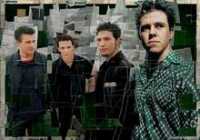For 12 STONES, rural Mandeville, Louisiana provided the environment that brought the band together and groomed a sound that mirrors the best of Modern Rock while tipping its hat to elements indigenous to Mandeville and the rural Deep South. Though the members of 12 STONES are young in years, they are undeniably robust with songwriting prowess and musical ability. The band's debut is powerful and aggressive, but at the same time seething with anthemic qualities and melody that surely will enrapture listeners upon first listen. The offering is unconditionally impressive when considering three of the four band members are under 21 years old.
12 STONES hail from a small suburb North of New Orleans. Vocalist Paul McCoy describes Mandeville as a "real small music scene. If you weren't in a cover band there really wasn't any place to play. We didn't want to do that, and unanimously were committed to making good music that we believed in." The road to the release of their debut album stands apart from the many who labor for years on end in the hopes of getting that first break. After roughly a dozen gigs in public, the band's demo began making the rounds.
12 STONES took to New York and performed for an audience of industry representatives. Bassist Kevin Dorr looks back upon the experience with humor, "I was very nervous to play in front of all those record executives just sitting there staring at us. A few hours earlier, it being my first time in New York City, I decided to try Sushi. I ended up turning green and throwing up in the bathroom. I felt sort of sick when we first started playing. I haven't eaten anything raw since then." Frontman and singer-songwriter McCoy adds, "We'd been in New York for about three hours and while walking through Times Square I get pick-pocketed. So here we are, our first few hours in New Yor City, and Kevin is puking in the bathroom and I'm chasing some guy who stole my wallet just a few hours before we play the showcase. It was crazy."
There was no doubt that something special was about to spring from the town of Mandeville, Louisiana. Within just 15 months of forming, the band signed to Wind-up and was on their way to recording their debut in Los Angeles. Once in L.A., they entered the studio to record with producer Jay Baumgardner (Papa Roach, Drowning Pool, Alien Ant Farm). The result of those sessions is proof positive that neither geography nor chronological age have anything to do with maturity or talent. Baumgardner is enthusiastic in his assessment: "The enormity of this band is going to shock the industry." Kind words from a man who has been behind the board for many of the most influential rock debuts from the past few years. Vocalist McCoy offers, "We really enjoyed working with Jay and learning how the recording process worked. It was a great atmosphere in the studio." Guitarist Eric Weaver remarks," I like Jay's style and he's a great dancer."
The album is undeniably well-rounded and filled with hard rocking melodic tunes that could very well become future classics. In "Broken," the listener's attention span is taken hold of with absolute force, but then held on to by a hooky melody that seems to be an undercurrent guttural force against soothing refrain. Weaver and McCoy display an ease in collaboration where the vocals and guitar work seem to live and breathe together as one. "The Way I Feel" showcases McCoy's seductively aggressive voice and earnest emotion, teaming it with Weaver's guitar work that displays the arrival of a talent that could make major strides in returning the guitar solo to radio. Critics who claim "rock is dead" certainly have not been exposed to Weaver's work. The playing is for real, as anyone who has seen this band live can attest. Weaver could well become the first new guitar hero to emerge in the 21st Century.
Some of these tracks have an air of anger, but when looking deeper into the lyrical content it becomes clear that the band is trying to share emotion many young Americans feel in this day and age. McCoy says, "We really want to be positive. Our songs are about some of the really tough times I went through as I was growing up. I really wanted to target subjects in our songs that kids going through crises can relate to. But we didn't want to be negative. It doesn't mean you can't be angry and the songs powerful. We just want to stream negative energy in a positive way. Sometimes you have to accept that you are not in control of a good part of your life. The weird thing is that once you acknowledge that you have no control, it somehow helps to make it through. It gives you strength."
The album that introduces 12 STONES to the world outside Mandeville is screaming with natural talent. Whether it is Weaver and McCoy's absolute synchronicity in bringing their talents together, or the explosive rhythm section of Dorr and Gainer, this band has a lot to offer. There is no doubt that they have crafted a collection of songs that are going to find an audience that jumps on the tracks for the ride. As the band evolves and grows, the thought of what this talent will bring to the airwaves is awesome.
